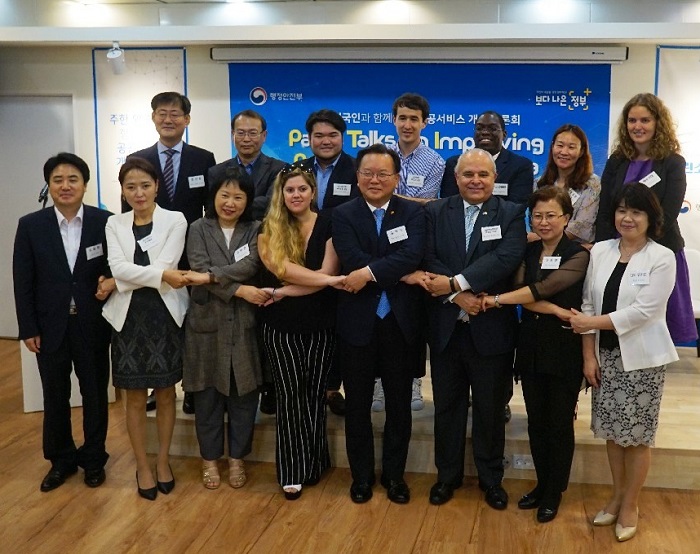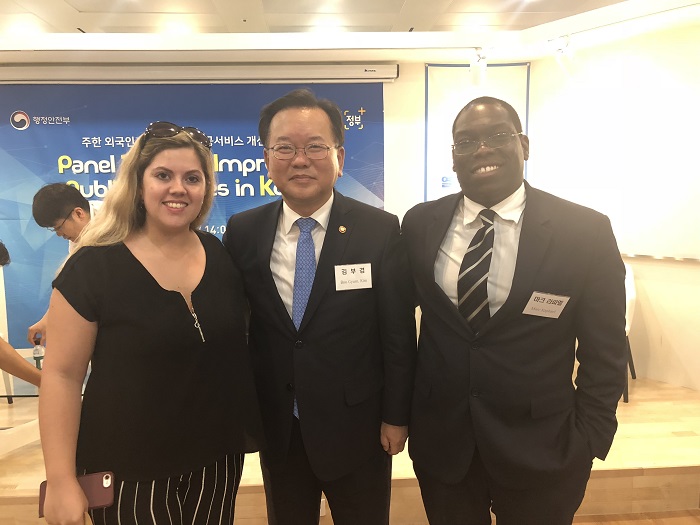View this article in another language
- 한국어
- English
- 日本語
- 中文
- العربية
- Español
- Français
- Deutsch
- Pусский
- Tiếng Việt
- Indonesian

Non-Koreans living in Korea gather in July to discuss ways to improve public services in Korea.
By Korea.net Honorary Reporters Sofia Caceres from Argentina and Marc Raphael from Haiti
Photos = Marc Raphael
In 2018, Korea was the center of some major historic events, such as the PyeongChang 2018 Olympic and Paralympic Winter Games and the Inter-Korean Summit between the President Moon Jae-in and North Korean leader Kim Jong Un. In the shadow of those headline-grabbing moments, some less glamorous events also made their way into the history books while shaping the daily lives of the citizens and Korea's growing non-Korean community. One of these less quiet, yet memorable, occurrences was the panel talks on improving public services in Korea organized by the Ministry of Interior and Safety. The forum took place at the Ministry of Foreign Affair on Wednesday, July 11, and gathered immigrants from different backgrounds and walks of life to talk with many public officers from different agencies across the Korean government.
Leading the government delegation was Minister of Interior and Safety Kim Boo Kyum accompanied by the Deputy Minister for Government Innovation and Management Kim IIjae and Public Service Innovation Division Director Jeong Seon-yong. Other government employees from the Ministry of Justice and the immigration services also participated in the talks. On the other side, the non-Korean community in Korea was mainly represented by a diverse group of panelists, ranging from diplomats, such as the Ambassador of Guatemala to Korea Meneces Coronado, and Eva Moor from the Belgium Embassy, through to entrepreneurs like Sofia Caceres and myself, Marc Raphael, community organizers like Urpiiana Turaeva, Taki Yujari, An Shunhua and Kyung Eun Kim, a student. There were also Boquiev Ahrorjon and Rigoberto Banta Jr., assistant program specialists at UNESCO. The general audience was also formed by a diverse group of expatriates and representatives of several public-sector organizations.
After a brief welcome note by Minister Kim, where he underlined the importance of the event for the organization he’s leading and the overall efforts of the government to improve life in Korea for non-Koreans, the forum started around the topic of “improving public services for a better life”. Moderated by Professor Kim Mi-Kyung, the first session was animated by five panelists: Meneces Coronado, Sofia Caceres, Urpiiana Turaeva, Taki Yujari and Boquiev Ahrorjon. Ambassador Coronado kicked off the conversation with the issue of tax returns, which has been affecting him and his colleagues in the diplomatic corps. In Korea, diplomats have to wait up to six months to collect their tax return.
The second issue raised by Coronado was even more relatable: government-issued ID cards are usually not sufficient to conduct the most basic activities in public offices and businesses in Korea. Even with their IDs properly issued and valid, non-citizens are almost always required to provide their passports additionally. Caceres alluded thus in her words, as well as other members from the audience. Overall, they recommended the government take action by communicating to its employees and to the public in general the importance and the value of the Alien Registration Card (ARC) while requiring that they be accepted as appropriate pieces of identity for non-citizens.
Related to the subject of regulations were most of the discussions that occurred in the second part of the event. The second group of panelists included Eva Moor, An Shunhua, Kim Kyung Eun, Rigoberto Banta Jr. and myself. We were charged with conducting a debate about doing business in Korea as non-citizens. In my speech, I congratulated Korea for its efforts to open its doors to foreign investors and I suggested some regulatory reforms that could create a more agile and startup-friendly business ecosystem, while moving away from the traditional rigidness and inflexibility of its processes. The current state of doing business in Korea can be very complicated, even with the help of specialized professionals like attorneys and accountants. Redundant requirements and inaccurate information sometimes cause unnecessary wastes of time and money.

Korea.net Honorary Reporters Sofia Caceres (left) and Marc Rafael (right) pose for a photo with Kim Boo Gyum (center), the minister of interior and safety.
Another hot topic at the event was the lack of consolidated information available for non-citizens in the public system. Even though some government websites have an English section, they mostly offer partial or disparate information. When in need to carry out some administrative procedures, a non-citizen or anyone who is not fluent in Korean language has to consult several different agencies. Very often, an undesirable back-and-forth process over the phone or an in-person interview is required due to the unavailability and the unreliability of the information found online. As a potential solution, Caceres recommended the creation of an intra-ministerial website translated into the most common non-Korean languages in Korea, which would be implemented as a one-stop shop for non-citizens living here. There, they could find accurate information, updated and clear procedures they can follow for all types of activities, all in well-written and clear prose.
Also, in regard to technology, Ahrorjon, who has been studying in Korea for the past four years, raised the subject of outdated software, like the required usage of Microsoft's Internet Explorer browser to access all government services online. Several of the participants agreed with him and related their struggle to navigate through government websites. Following the same line, and from my perspective as a cybersecurity specialist, I shared further details about the risks posed by the usage of unsupported software and I offered my advice and help fix the issues.
Immigration was the most debated subject at the event. Several panelists touched on different aspects where their area of work was affected by some policies or the lack thereof. “It’s really difficult for Ph.D. students to obtain a specific visa to participate in an internship program here,” said Eva Moore, a cultural attaché at the Belgium Embassy in Seoul. “Every time I visit an immigration office, the officers get very nervous and almost try to avoid me in fear of addressing me in English,” Ahrorjon told the audience. Therefore, he recommended an improvement in the training of the personnel that would enable them to assist non-citizens properly. He also suggested the implementation of a volunteer program where expatriates could guide and support others throughout their integration into Korean society.
Taki Yukari, a married person who has been living in Korea for almost 30 years now, said that, “Some non-Korean wives are not duly protected by Korean law, making them vulnerable to domestic and work abuse.” In addition, Kim Kyung Eun proposed the creation of shelters and legal counseling services for such women in need. From the public side, some great ideas also emerged. The Ecuadorian consul suggested the designation of specific days to assist people in different languages at the immigration offices. Also, he advocated for a decentralization of those offices, bringing them closer to areas where non-citizens gather, such as universities, churches or certain neighborhoods.
To finalize the event, a public officer representing the immigration department answered some questions and provided some details about the government’s ongoing projects to improve services. His remarks followed the same line as Minister Kim Boo Kyum who, before his early departure, explained the central government’s efforts and its will to make public services more accessible to non-citizens and to new Koreans alike. He recognized that despite thinking of itself as an advanced country with a GDP averaging USD $30,000 per capita, Korea has a long way to go to fully integrate its growing non-citizen and non-ethnic Korean community into Korean society. Paraphrasing Taki Yukari, Korea should include non-Koreans as full members of society and consider them as partners to help build the country as a whole. This forum organized by the Ministry of Interior and Safety was one of the biggest steps ever in this direction. The participants were grateful for the opportunity to make their voices heard and they are hopeful that further actions will be taken to solve most and maybe all of the issues debated.
wisdom117@korea.kr
* This article is written by a Korea.net Honorary Reporter. Our group of Honorary Reporters are from all around the world, and they share with Korea.net their love and passion for all things Korean.